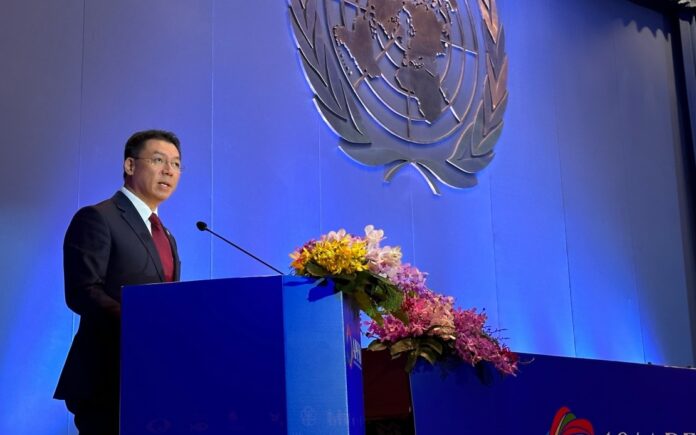BANGKOK, March 27 — Malaysia is making every effort to accelerate progress towards achieving the Sustainable Development Goals (SDGs) by 2030.
Local Government Development Minister Nga Kor Ming said institutional frameworks have been set to ensure inclusive participation involving all level of stakeholders to accelerate the implementation of the SDGs.
He said the COVID-19 pandemic has reversed some of Malaysia’s gains in SDG progress earlier and has further exacerbated existing social and economic inequalities.
Out of the 146 indicators available in 2020, 49 (34 per cent) have improved, 34 (23 per cent) have not changed, while 41 (28 per cent) have decreased, while the remaining 22 (15 per cent) are non-statistical indicators.
“Malaysia remains committed to achieve the goals… We want to prove to the world that we are a serious global player to push for SDGs goals based on all initiatives, legal framework, and core national policies.
“We hope that by our commitment, determination, and by working with other countries, we will be able to make Malaysia an exemplary model of SDG goals,” he told Bernama here, today.
Nga is attending 10th Asia-Pacific Forum on Sustainable Development in Bangkok. He joined 1,300 representatives from 51 countries in the forum organised by United Nations Economic and Social Commission for Asia and the Pacific.
The forum brought together a cross-section of key development actors, including senior government and UN officials, the private sector, youth and civil society representatives to share their challenges and experiences to deliver a common goal.
At the forum, Nga also delivered country statement on “Towards the 2023 Sustainable Development Goals Summit” where Nga said his ministry is focused in seven key areas that will effectively accelerate the localisation of the SDGs.
These include enhancing our smart and sustainable cities agenda, develop and empower local government, strengthen municipal finance, develop a comprehensive housing plan, empower communities, manage our solid waste effectively and efficiently towards circular economy and strengthen the readiness of our firefighters, he said.
Meanwhile, Nga said the government would enhance the quality of urban areas by providing social spaces that improves livability, reduce carbon emission and at the same time conserve and protect the biodiversity of the city.
“We have to date 11,773 parks and open spaces that are made accessible to the public. We have also planted 58.52 million trees to date and the target is 100 million trees by 2025 and provide 20 metre square of open spaces and green areas to every resident,” he said.
To spearhead the strategic initiative towards the development and deployment of EV in Malaysia, Nga said his ministry has developed the Planning Guidelines of EV charging stations in Malaysia.
Malaysia has also developed the Low Carbon Mobility Blueprint (2021–2030) which are strategies and action plans for the land transport sector to achieve the objective of reducing energy consumption and GHG emissions by the year 2030.
Nga said there are many more efforts undertaken to ensure we achieve the 2030 agenda.
















